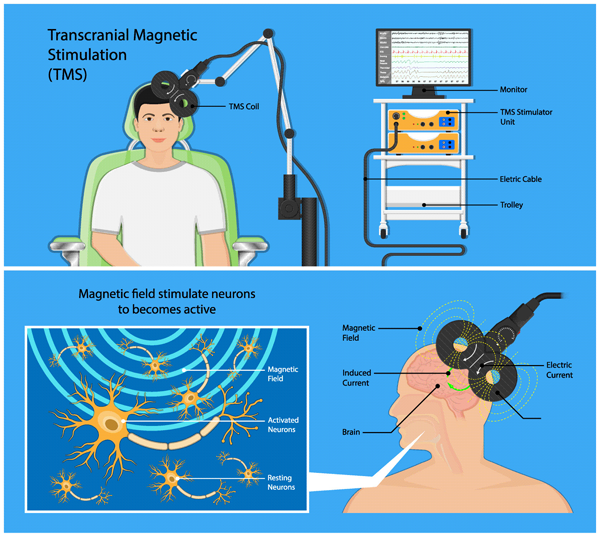Transcranial magnetic stimulation
Transcranial Magnetic Stimulation (TMS) is an innovative and evidence-based treatment that has been gaining popularity as a safe alternative to medication for people who suffer from depression, anxiety, and obsessive-compulsive disorder (OCD). Unlike medication, TMS has a very low risk of side effects and is pain-free and non-invasive.
Symptoms of depression, anxiety, and OCD are caused by deviations in brain activity, and TMS is used to treat these symptoms by correcting the brain’s activity using a series of short electro-magnetic stimulation pulses. TMS can help to upregulate or downregulate these areas, depending on the individual’s symptoms. For example, depression is often associated with slower brain activity in the left prefrontal cortex, so TMS is used to stimulate this area at a higher frequency to upregulate it. On the other hand, anxiety and depression have been linked to elevated activity in the right prefrontal cortex, so TMS is used to inhibit this area at a lower frequency.

depression
Research has demonstrated that individuals presenting with depression have slower brain activity, notably in the left prefrontal cortex. TMS is used to upregulate these areas, by applying the magnetic coil and stimulating the brain at a higher frequency. Depression and anxiety have also been shown to be associated with elevated activity in the right prefrontal cortex. In this case, TMS is administered using a lower frequency to inhibit this fast brain activity.
obsessive compulsive disorder (OCD)
OCD is a disorder characterized by repeated, distressing intrusive thoughts and compulsive behaviors aimed at reducing anxiety. TMS for OCD uses a specific TGA-approved coil that targets the medial prefrontal cortex (MPFC) and anterior cingulate cortex (AAC), areas that form part of the cortico-striato-thalamo-cortical (CSTC) circuit, which is overactive in individuals with OCD. A deep and low-frequency TMS protocol is used to effectively relieve the OCD symptoms.
neurodevelopmental conditions
TMS has become increasingly popular as a treatment option for a variety of mental health, neurological, and neurodevelopmental conditions, including PTSD, ADHD, Autism, neuropathic pain, and tinnitus.
ADHD
Recent studies indicate that TMS may help alleviate ADHD symptoms by stimulating the right prefrontal cortex at a high frequency of 10Hz-20Hz. This rapid stimulation could enhance the activity in dopaminergic circuits, which tend to be underactive in individuals with ADHD. By increasing dopamine activity, TMS has the potential to improve attention by reducing distractions and impulsivity by decreasing the need for immediate reward. While TMS could be a viable treatment option for ADHD, more research is needed in this area to confirm its effectiveness.
AUTISM
Autism Spectrum Disorder (ASD) is a condition that affects social communication, repetitive behaviors, and sensory processing. Researchers believe that these behaviors are linked to unusual activity patterns in the dorsomedial prefrontal cortex (dMPFC), a region of the brain that allows us to understand the thoughts and intentions of others. Studies have shown that deep TMS targeting the dMPFC may help improve social and repetitive behaviors in individuals with ASD. While research in this area is promising, more studies are needed to determine the effectiveness of TMS in reducing ASD symptoms.
TMS treatment sessions are of a short duration and individuals are able to resume normal daily activities immediately following a treatment. For more information about TMS, please contact TMS@awarehub.com.au or organise a call with one of our Friday TMS nurses here https://awarehub.com.au/clinic/tms/


